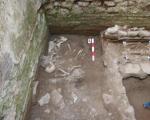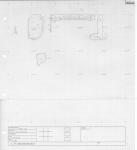Interpretation
-
- It seems possible that the ossuary pit could be related to the group of constructed tombs (3153), (3151) and that of *3102. It was suggested that it may be the deposit area used when the graves were cut for the insertion of the bell-casting pit. Since the pavement was in place at this time, however, this cannot be the case, though it does seem likely that the bones are of individuals buried in the chapel area. Perhaps the dump is from the reuse of these graves.
-
- Megan McNamee
- 27-7-2007
Stratigraphic Relationships
- No Linked Records
Site Photo
Description
- compaction, color, composition
- trowel, hand pick, brush
- N-S: 1.05 m; E-W: 0.67 m; depth: 0.31 m
- very dry, powdery earth and a great number of bones
- grayish brown
- very loose
- some loss
- artificial
- bones
- Ceramic, fragments of brick and worked marble, spicatum bricks
- An ovular shaped ossuary pit in the NW corner of the chapel containing a great deal of light, loose earth and the bones of at least four individuals - adults and children (the pit included four heads piled against the west wall of the chapel). Only major bones were found in the pit, i.e. those of the arms and legs, some spine and ribs, but none of the smaller bones of the feet or hands.
- This cut was revealed in early in the excavation (2006) and was initially thought to be contemporary with the grave cuts of 3022 and 3042 or 3061, 3048, and 3097. As such, it was partially dug; the bones of the fill, however pass under pavement 3127 and may be articulated (initially they looked like inclusions). This early excavation may have led to some loss and/or contamination.
- mediocre
Ceramic Inventory
There are no results for this record

